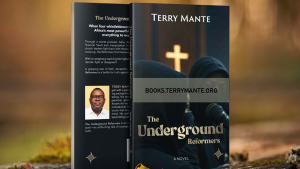When people hear that I’ve just released a work of fiction, the first thing they ask is, “So… who exactly are you talking about?” My answer is always the same: If you think you recognize someone in the pages of this book, maybe ask yourself why.
The Underground Reformers is, on the surface, a fast-paced novel about four strangers – Asha, Akello, Sandra, and Fatima – drawn together by a shared conviction that something is deeply wrong in the religious spaces they love. Beneath the suspense, secrecy, and danger lies my own lifelong wrestling with one stubborn question: Why do we fear asking questions?
I have been around churches long enough to know the beauty and power of faith. I have seen communities transformed, broken people restored, and lives inspired to dream again.
But I have also seen the dark side: unquestioned authority, manipulation disguised as “divine instruction,” and wealth without accountability. When leaders demand obedience without space for doubt, the ground becomes fertile for abuse.
This book was my way of holding up a mirror – not just to pastors in shiny suits or congregations swaying to a perfect choir, but to all of us. Fiction gave me a safe distance to explore unsafe truths. It allowed me to weave together scenarios that are imaginary in detail, but real in principle.
Asha, the journalist turned reluctant whistle-blower, came from my fascination with people who step into the ring against the powerful, knowing they will be outspent, outshouted, and possibly outlawed. Akello, the principled lawyer, channels my own frustration at seeing good laws weaponized to protect the guilty.
Sandra, the theologian, carries the ache of every believer who has been told, “Don’t rock the boat” when they pointed out that the boat was leaking. And Fatima, the financial analyst, embodies the cold-sweat moment when evidence is clear but the cost of speaking is too high.

As I wrote, I found myself asking: Would I have their courage? Or would I quietly choose comfort over conflict?
You might say the book is about church corruption, but I think it’s really about human nature. Because the patterns the Reformers expose – greed, manipulation, abuse of power – are not unique to pulpits. They appear in boardrooms, political parties, NGOs, and even families. Institutions of all kinds thrive in the shadows of unquestioned loyalty. Shine light there, and you will quickly find out who your real friends are.
One of my favorite things about fiction is that it lets you smuggle truth past people’s defences. If I published a straight exposé, some readers would reflexively decide I was attacking “the church” or “their man of God” and never hear the heart of my message. But wrapped in the intrigue of four strangers running an anonymous podcast, the truths have a better chance of slipping through. People drop their guard when they think they’re “just” reading a story.
Of course, this doesn’t mean I’ve abandoned my roots in nonfiction. Years of writing about leadership, personal growth, and faith taught me how to structure an argument, build a case, and challenge thinking. I just chose to apply those tools to fictional soil this time; because sometimes the best way to tell the truth is to disguise it as a lie and let the reader dig it out.
Some have asked, “Terry, aren’t you afraid that people will assume you’re talking about specific pastors?” My answer is that if the shoe fits, maybe it’s worth asking why it does. The Underground Reformers are not anti-church. They’re pro-truth. They love their faith enough to demand that it be worthy of the name. And if that love looks like rebellion to some, perhaps it’s because our definitions of loyalty have been too narrow.
When you read this book, I don’t want you to simply decide who the “heroes” and “villains” are. I want you to find yourself in the story. Are you Asha, compelled to speak? Akello, balancing justice with personal risk? Sandra, torn between doctrine and truth? Fatima, weighing the evidence against the danger? Or are you a silent bystander, hoping someone else will fight the fight?
The beauty and the danger of stories is that they ask questions long after you’ve turned the last page. So my real hope is not that The Underground Reformers will entertain you (though I believe it will), but that it will make you uncomfortably curious. That it will make you pause the next time someone says, “Don’t question, just obey.” That it will spark conversations in church halls, on Facebook timelines, on WhatsApp threads, over dinner tables.
Because at the end of the day, this is bigger than religion. It’s about power, truth, and the cost of integrity. It’s about the courage to hold even our most beloved institutions to account. And it’s about remembering that faith, if it is worth anything at all, can withstand every honest question we throw at it.
So, yes, I wrote this story. And if it makes you uncomfortable… good. That means you’re listening.
——Bottom of Form
About the author
Terry Mante is a thought leader whose expression as an author, corporate trainer, management consultant, and speaker provides challenge and inspiration to add value to organizations and position individuals to function effectively. He is the Principal Consultant of Terry Mante Exchange (TMX). Connect with him on LinkedIn, Facebook, X, Instagram, Threads and TikTok @terrymante and www.terrymante.org.










